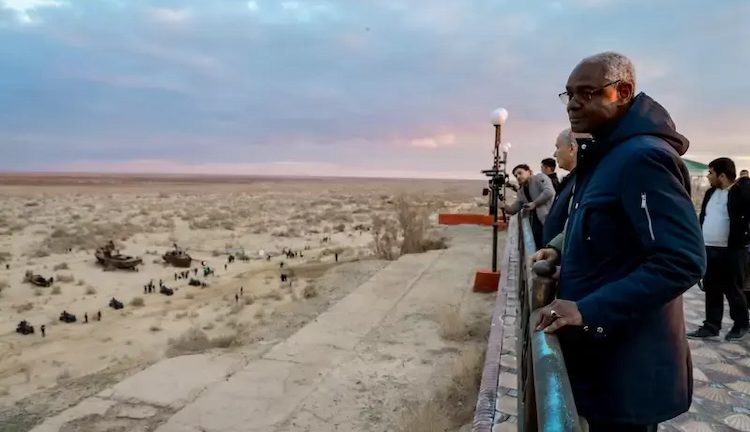UNCCD Special Feature
BONN | 17 June 2024 (IDN) — In the haunting expanse that was once the flourishing Aral Sea, the aftermath of an environmental catastrophe unfolds with swift and devastating consequences. Once the fourth largest freshwater lake in the world shared by Kazakhstan and Uzbekistan, the Aral Sea has lost about 90% of its original size since the 1960s, a vast expanse of sand and desert, and a poignant reminder of one of the gravest environmental disasters on a global scale.
This tragic transformation, unfolding over a single generation, speaks volumes about the heedless exploitation of nature’s resources. A once 40-meter-deep freshwater body, sustaining a robust fishing industry and a lifeline for communities living its shores, the Aral Sea has now disintegrated into two distinct bodies of water, leaving abandoned port cities stranded amidst rusting ship relics.
Formerly spanning an area of 68,000 sq km, the Aral Sea’s decline began in the 1960s, ultimately drying up by the 2010s. The root of this calamity lies in the over-harvesting of the rivers that fed this landlocked sea for large-scale irrigation projects, mainly cotton production. The result was a rapid shrinkage of the sea, accompanied by an alarming increase in salinity. The shifting shores, now miles away from deserted port towns, reveal a harsh, inhospitable landscape, where sand and dust storms have taken the place of the cool breezes and lapping waves of yesteryear.
In the unforgiving environment where summer temperatures exceed 45°C and winters plunge below freezing, the dried seabed has become a barren wasteland. The absence of freshwater inflow has eradicated the source of sustenance for nearby communities, leaving them grappling with the harsh reality of survival in a transformed and desolate terrain.
The shrinking of the Aral Sea drew global attention, prompting former United Nations Secretary-General Ban Ki-moon, after visiting Muynak in 2011, to label it “one of the planet’s worst environmental disasters.” The story of the Aral Sea serves as a powerful warning to the world, highlighting the dangerous consequences of taking nature’s abundance for granted and viewing environmental resources as limitless commodities to be endlessly exploited.

Despite this dark scenario, pockets of hope are appearing from the region that is now known as Aralkum, or Aral Desert. The Government of Uzbekistan has prioritized rehabilitation efforts, launching initiatives to plant vegetation and combat the advancing sand dunes, striving to reclaim parts of this desolate moonscape. Local scientists, innovative in the face of adversity, are tirelessly searching for salt-tolerant plants to bring the salty soil back to life.
Millions of hectares of sturdy saxaul shrubs are being planted as the first line of defense against desertification and sand and dust storms originating from the dried-up Aral seabed. Over half of the three million degraded hectares have already been restored in Uzbekistan, resulting in the largest decrease in land degradation across Central Asia in just four years.
The resilience and determination of the people in the face of such devastation are awe-inspiring. Their efforts to adapt to drastically altered circumstances underscore the possibility of mitigating even the most severe damage with committed action. The vision and political will demonstrated in this parched landscape offer a glimmer of hope that restoration is achievable, even in the wake of profound ecological collapse. [IDN-InDepthNews]
Photo: Pockets of hope are appearing from the region that is now known as Aralkum, or Aral Desert. Source: UNCCD

